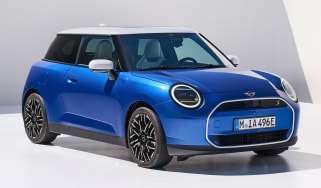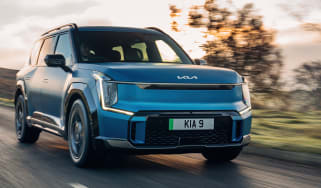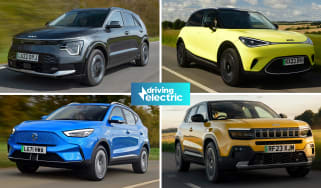Fiat 600e review
Almost as stylish as the smaller 500e, the Fiat 600e is a desirable small electric crossover with decent range, but a cramped interior
_qi40tr.jpg)
Pros
- Easy to drive
- Stylish cabin
- Competitive pricing
Cons
- Some rivals offer more range
- Not all that practical
- Average warranty
|
Car type |
Range |
Wallbox charge time |
Rapid charge |
|
Electric |
252 miles |
7hrs 30mins (0-100%, 7.4kW) |
29mins (20-80%, 100kW) |
Fiat 600e verdict
The ‘Frappuccino' of the small electric SUV space, the Fiat 600e manages to be fashionable while also retaining a small whiff of the old Italian charm that made its predecessors popular in the first place. Drawing on elements of the smaller, retro 500e with mixed results, Fiat’s first zero-emissions crossover is appealing nonetheless thanks to its light and premium-feeling interior, cutesy looks and competitive starting price.
It may not be all that spacious, but neither are many of the 600e’s rivals, and while a 250-ish-mile range is nothing to write home about either, it should be more than sufficient for city buyers. If you view a car as you would a fashion accessory, the Fiat 600e is a designer handbag that’ll be sure to turn heads – just don’t expect it to be the most practical option out there.
Details, specs and alternatives
Fiat has long tried to capitalise on the hype surrounding its iconic 500 city car, resulting in a handful of disappointing Frankenstein-esque creations like the 500X crossover and 500L MPV. The Italian maker is hoping it’ll have more success in the electric age though, with the new Fiat 600e being introduced as the larger SUV sibling to what is our favourite small electric car, the Fiat 500e.
So, it’s the same but bigger? Not quite; instead of sharing its parts with the smaller and similar-looking 500e, the Fiat 600e actually gets its e-CMP underpinnings from the likes of the Jeep Avenger, Vauxhall Mokka Electric and Peugeot e-2008.
Like those cars, the Fiat SUV is powered by a 54kWh battery, alongside a 154bhp electric motor. Range stands at a fairly average 252 miles, while Fiat says a 20-80% charge is possible in under half-an-hour, provided the 600e is connected to a compatible public DC rapid charger.
There may only be one battery and electric motor to choose from, but Fiat gives you two options in terms of trim levels; the base Fiat 600e Red starts from around £33,000 and is yet another collaboration with U2 frontman Bono’s charity.
On the theme of generosity, the 600e Red comes well-equipped as standard, despite being the entry point into the range. All cars get LED headlights, a digital instrument cluster, a 10.25-inch touchscreen with wireless Apple CarPlay and Android Auto connectivity, automatic air conditioning and rear parking sensors. Going for the Red edition also limits you to a certain exterior colour – we’ll let you guess what that is…
Stepping up to the La Prima model costs an extra £4,000, so it’d better be worth the upgrade. Fiat certainly thinks it is, with the top-level 600e getting larger 18-inch alloys, leatherette upholstery, heated front seats with an electric, massaging driver’s seat, built-in sat nav, a wireless phone charger, adaptive cruise control, a reversing camera and a powered bootlid.
Like all Fiat models, the 600e comes with a three-year/60,000-mile warranty, which is quite a bit behind the seven years of cover offered by Kia. Fiat will cover the 600e's battery for up to eight years and 100,000 miles, though, for extra peace of mind.
Range, battery size & charging
|
Range |
Wallbox charge time |
Rapid charge |
|
252 miles |
7hrs 30mins (0-100%, 7.4kW) |
29mins (20-80%, 100kW) |
Fiat says the 600e is capable of up to 252 miles on the combined WLTP test cycle. In our experience driving the 600e, as well as its mechanical siblings such as the DS3 E-Tense, a real-world range of around 200 miles is a safe bet, although Fiat does say up to 370 miles is possible if you’re solely driving around town. A standard-fit heat pump should help the 600e get closer to Fiat’s claimed figure in the colder months, too.

Standard 100kW DC charging is pretty average for this class of car, although the much cheaper MG4 can top-up at speeds of up to 135kW. Find a suitable public charger and Peugeot says a 20-80% top-up will take 29 minutes. Using a standard 7.4kW home wallbox will take considerably longer, though; most homes don’t have the three-phase electrics required to make use of the 600e’s maximum 11kW AC charging speed, so at 7.4kW a full charge will take around seven-and-a-half hours.
Running costs & insurance
Starting from around £33k, the Fiat 600e is pretty expensive for a small crossover – but not necessarily so for an electric one. It undercuts many of its rivals, despite Fiat's pseudo-premium image, and should be relatively cheap to run, too.
Charging an EV at home is much more affordable than filling a car up with petrol; at the time of writing, the current average electricity rate is 30p per kWh, therefore costing owners just £15 to top-up the 600e from 0-100%. Using a public rapid charger is slightly more expensive though, pushing the price up to around £40.
Company car drivers are likely to benefit most by choosing the Fiat 600e over a comparable petrol model as the 2% Benefit-in-Kind tax incurred by the 600e’s electric powertrain can be as little as £132 per year. EVs are also exempt from road tax (VED) until 2025, and the same goes for London’s Congestion Charge.
Performance, motor & drive
|
0-62mph |
Top speed |
Driven wheels |
Power |
|
9s |
83mph |
Front |
154bhp |
While its sister car, the Jeep Avenger, is designed to go off the beaten track, the Fiat 600e has clearly been designed to thrive in urban environments. A supple suspension setup means the Fiat manages to cope better lumps and bumps in the road compared to rival EVs that tend to have firmer rides – a Citroen e-C4 is even more relaxing, though.
The Fiat 600e really is quite small for an SUV, so that combined with incredibly light, yet precise steering makes it a piece of cake to drive around town. It’s even pretty capable if you take it out onto the motorway, or some twisty back roads – although, the ‘Sport’ function does seem a bit superfluous in a car like this. We’d just leave it in ‘Normal’, unless you need the extra range provided by the ‘Eco’ setting which does limit power somewhat.
Speaking of power, the Fiat’s 154bhp electric motor is the same one that’s found in many other small Stellantis (Fiat’s parent company) SUVs and we’ve no real complaints. While it might not offer the same stratospheric acceleration as you’d find in the slightly larger Smart #1 Brabus, it’s certainly smooth and offers plenty of poke from around 0-30mph which, if we’re honest, is where it’s most important for this kind of car.
Interior, dashboard & infotainment
The inside of the Fiat 600e is less ‘Dolce Vita’ and more ‘Deja vu’, as there’s once again plenty of similarities between the Fiat and its Jeep Avenger counterpart. Material quality is strong and the layout is generally the same across the board, with the same UConnect infotainment system – more on that in a moment – and iPad case-style centre console lid.
That being said, the 600e gets the same circular digital instrument cluster as the smaller 500e; this works fine on that car, but the 600e’s rivals have much more sophisticated screens that show a lot more than solely the most vital information like speed, range etc.
Fiat’s new infotainment system, while not brimming with features, is certainly better than the brand’s fiddly screens of old. Everything is logically laid out where you’d expect it to be, and the screen responds nicely to your inputs.
Boot space, seating & practicality
|
Length |
Width |
Height |
Boot space (seats up/down) |
|
4,171mm |
1,781mm |
1,523mm |
360/1,231 litres |
Fiat has spoken at length about how much more spacious the 600e SUV is compared with the 500e city car; that’s not saying a lot, though, as the electric 500 really is one of the least practical EVs you can buy.
Things aren’t awful in the Fiat 600e, though; there isn’t a huge amount of head and legroom, but the plug-in Fiat SUV is more than capable of transporting four adults – taller individuals in the rear may feel a bit cramped, however. There is a third seatbelt in the back, but sitting three abreast will be a very tight squeeze and is only really feasible (and ethical!) for shorter journeys.
Open the Fiat 600e’s bootlid (powered on La Prima models) and you’ll be greeted with 360 litres of space. It’s worth mentioning that Hyundai Kona Electric is only slightly more expensive than the Fiat and boasts a comparatively cavernous 466-litre boot. That being said, a Vauxhall Mokka Electric will offer similar space to the Fiat which boasts a very small load lip, making it very easy to slide heavy shopping bags inside.
Reliability & safety rating
As mentioned, the Fiat 600e sits on the tried-and-tested e-CMP platform, which should mean it’ll be reliable and easy to source parts for if something goes wrong. That’s good, as Fiats aren’t exactly known for being great in this regard; the Italian maker placed a lowly 31st out of 32 manufacturers in our 2023 Driver Power customer satisfaction survey. Only 12% of owners reported a fault with their cars within the first year of ownership – amongst the lowest in the survey – although build quality was a big sticking point.
The Fiat 600e should be very safe, though; it’s yet to be crash tested by Euro NCAP, but many of its mechanical siblings have already undergone the increasingly stringent examination and came out with a solid four-out-of-five stars. All 600e models come as standard with autonomous emergency braking (AEB), traffic sign recognition, driver drowsiness monitoring, lane departure warning and lane-keep assist. Top-spec cars also boast blind-spot monitoring and adaptive cruise control for less worries out on the motorway.

_oquv1f.jpg)
_cqtr1w.jpg)
_dff7yw.jpg)
_hh9x0k.jpg)
_rpubnd.jpg)
_ex3qs4.jpg)



